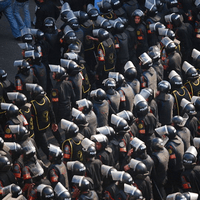One simple rule of revolution is that regimes fall when their security services refuse to fire on protesters, while uprisings often falter when security forces do go ahead and shoot. The situation in Egypt remains fluid, but thus far the Egyptian army has not violently put down the protest movement. Why? The answer is complicated.
Mark Thompson argued at Time's Swampland blog that the exposure of Egyptian military officers to norms of professionalism and civilian control in the United States may have been determinative in the Egyptian army's decision not to crush the anti-Mubarak protests. Thompson's argument draws on several strands of thought on how military-to-military contacts make a difference (.pdf). While it's almost certainly an exaggeration to assert that ties with the U.S. military caused the Egyptian army to observe restraint, it's quite likely that changing norms of military professionalism did play a role in the army's decision.
Nevertheless, there are reasons to be skeptical of an account of Egyptian army behavior focusing on military-to-military ties. The Egyptian army has many reasons for behaving as it has, including a reluctance to damage its hard-won position in Egyptian society. Senior Egyptian officers may also have feared that junior officers and enlisted personnel would disobey orders to fire on the protesters. Even to the extent that relations with the United States did have an impact, the direct provision of military equipment and training may have played a greater role than the diffusion of international norms.

